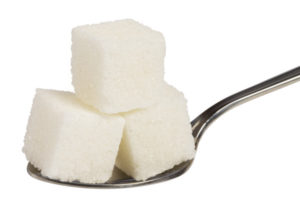 The artificial sweetener erythritol is added to many foods. However, this sugar substitute (which is often blended with stevia) may cause health problems . A recent small study found that consuming typical "sugar-less" foods, such as erythritol sweetened drinks or erythritol sweetened muffins, more than doubled the risk of blood clotting in healthy volunteers.
The artificial sweetener erythritol is added to many foods. However, this sugar substitute (which is often blended with stevia) may cause health problems . A recent small study found that consuming typical "sugar-less" foods, such as erythritol sweetened drinks or erythritol sweetened muffins, more than doubled the risk of blood clotting in healthy volunteers.
After consuming the drinks, their bodies made platelets (a type of blood cell) more active, which can raise the risk of blood clots. This did not happen after consuming regular sugar (glucose).
The researchers suggest instead of artificial sweeteners, to use sugar, honey, or fruit, but in moderation.
From Medical Xpress: New study adds to increasing evidence that sugar substitute erythritol raises cardiovascular risk
New Cleveland Clinic research shows that consuming foods with erythritol, a popular artificial sweetener, increases the risk of cardiovascular events such as heart attack and stroke. The findings, from a new intervention study in healthy volunteers, show erythritol made platelets (a type of blood cell) more active, which can raise the risk of blood clots. Sugar (glucose) did not have this effect.
Published in Arteriosclerosis Thrombosis and Vascular Biology, the research adds to increasing evidence that erythritol may not be as safe as currently classified by food regulatory agencies and should be reevaluated as an ingredient. The study was conducted by a team of Cleveland Clinic researchers as part of a series of investigations on the physiological effects of common sugar substitutes.
Erythritol and other artificial sweeteners are common replacements for table sugar in low-calorie, low-carbohydrate and "keto" products. Erythritol is about 70% as sweet as sugar and is produced through fermenting corn. After ingestion, erythritol is poorly metabolized by the body. Instead, it goes into the bloodstream and leaves the body mainly through urine. The human body creates low amounts of erythritol naturally, so any additional consumption can accumulate.
Erythritol is classified by the U.S. Food and Drug Administration and the European Food Safety Authority as a GRAS ("generally recognized as safe") ingredient, allowing its use without restriction in food products.
However, recent studies by Dr. Hazen's group have found evidence that erythritol in typically consumed amounts may increase cardiovascular risk.
The current research builds on the team's previous study, published last year in Nature Medicine, which revealed that cardiac patients with high erythritol levels were twice as likely to experience a major cardiac event in the following three years compared to those with low levels. The study also discovered that adding erythritol to patients' blood or platelets increased clot formation. These findings were confirmed by pre-clinical studies.
The new human intervention study was designed to more directly observe the effects on platelets following erythritol ingestion at a dose typically contained in a "sugarless" soda or muffin. In 20 healthy volunteers, researchers found that the average erythritol level after eating increased over 1,000 times in the group that consumed erythritol compared to their initial levels. Results also revealed participants showed a significant increase in blood clot formation after consuming erythritol, but no change was observed after consuming glucose.
"This research raises some concerns that a standard serving of an erythritol-sweetened food or beverage may acutely stimulate a direct clot-forming effect," said study co-author W. H. Wilson Tang, M.D., research director for Heart Failure and Cardiac Transplantation Medicine at Cleveland Clinic. "Erythritol and other sugar alcohols that are commonly used as sugar substitutes should be evaluated for potential long-term health effects, especially when such effects are not seen with glucose itself."
He adds that the results of this study are especially notable because they come on the heels of another recent study by this research group showing that xylitol, another common artificial sweetener, produced similar increases in plasma levels and affected platelet aggregation in healthy volunteers the same way. Like erythritol, studies with xylitol also included large-scale observation studies demonstrating that high xylitol levels are associated with increased risk of heart attack, stroke or death over the following three years.
"I feel that choosing sugar-sweetened treats occasionally and in small amounts would be preferable to consuming drinks and foods sweetened with these sugar alcohols, especially for people at elevated risk of thrombosis such as those with heart disease, diabetes or metabolic syndrome," Dr. Hazen advises. "Cardiovascular disease builds over time, and heart disease is the leading cause of death globally. We need to make sure the foods we eat aren't hidden contributors."
